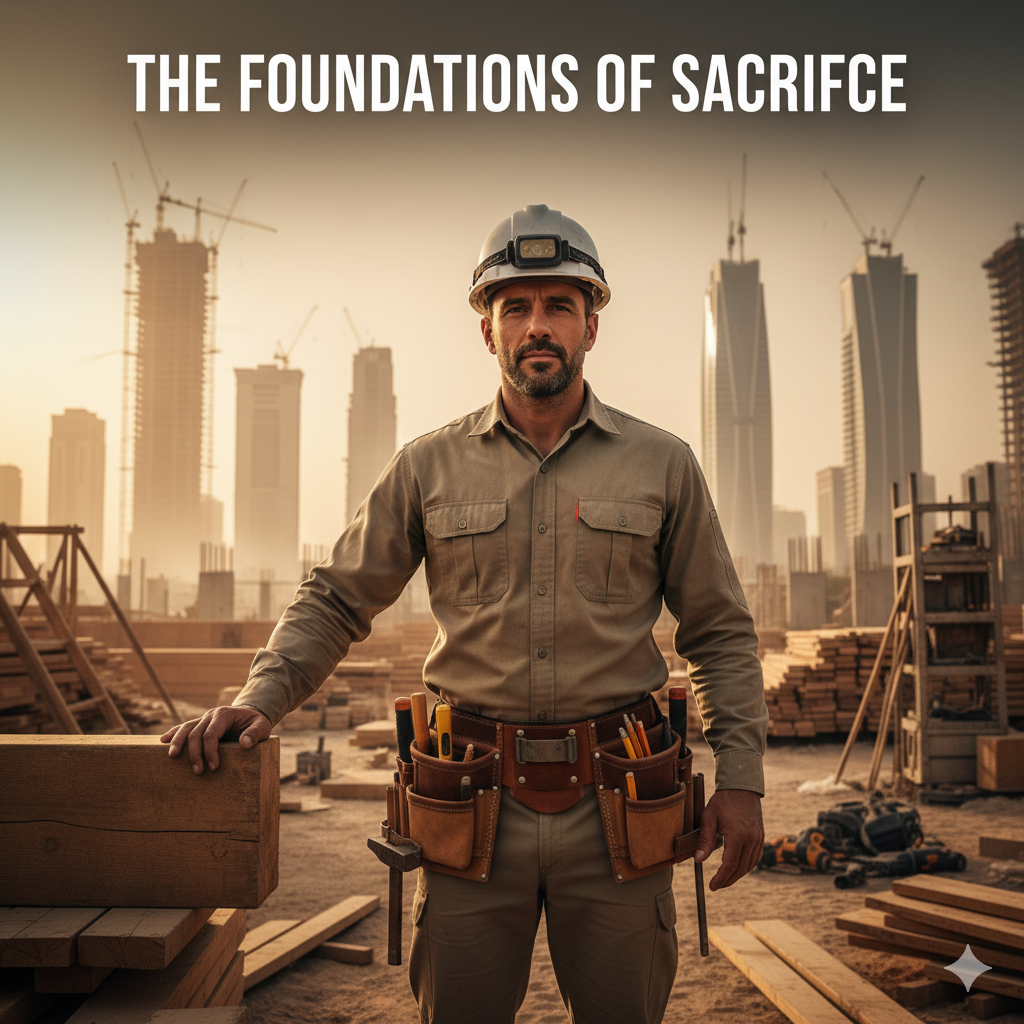Under the scorching desert sun of Riyadh, Manuel wiped the sweat from his forehead and stared at the steel beams rising before him. The sound of hammers, drills, and heavy machinery filled the air, blending with the distant hum of the city. To most people, it was just another construction site but for Manuel, it was symbol of his endurance, faith, and hope.
Back in the Philippines, Manuel grew up in a modest town in Iloilo. His father was a carpenter, and his mother sold vegetables in the market. From an early age, Manuel learned the value of hard work. He often helped his father mix cement or carry lumber for neighbor’s houses. When he turned eighteen, he followed in his father’s footsteps and began working as a construction helper. Life was tough, but every nail he hammered and every wall he built gave him pride.
He married his college sweetheart, Liza, and together they built a small life of love and dreams. They were blessed with two children Maricel and Paolo who became the light of their lives. But as the years passed, the bills piled up, and the cost of living grew harder to manage. The small construction projects in their town couldn’t provide steady income. Sometimes Manuel had to borrow money just to pay for school fees or buy food.
One night, as he sat with Liza on their porch, he said quietly, Lis, I think it’s time I go abroad.
Liza’s eyes welled up. I Know it’s for us, but it will be hard without you here. He took her hand and replied. I’ll endure the distance if it means our children will have a better life.
A few months later, Manuel found himself in Saudi Arabia, working as a construction foreman for a large development project. It was his first time abroad, and everything felt strange the language, the culture, the climate. But he was determined to adapt.
At first, the work grueling. Temperatures reached over 45 degrees celcius, and the long hours left him exhausted. Still, he pressed on. As a foreman, he supervised dozens of workers, ensuring safety and precision in every phase of construction. He earned respect from his team for his calm leadership and strong work ethic. When problems arose, he always found solutions whether it was a missing material or a sudden design change.
Each payday, Manuel carefully sent money home. He made sure Liza could pay the bills, buy school supplies, and save a little for emergencies. But every remittance came with a heavy price loneliness.
His evenings were the hardest. After work, he would sit in his small dorm room, scrolling through family photos on his phone. Video calls became his lifeline. His daughter often greeted him with excitement, showing her high grades. his son, though shy, would say, Papa, when will you come home? Each time, Manuel would smile and answer, Soon, anak, when the house is finished.
Months turned into years. He missed birthdays, anniversaries, and Christmas celebrations. But each missed moment fueled his resolve. Back home, his sacrifices bore fruit his children were excelling in school, and their small house was slowly being renovated.
One day at the site, tragedy almost struck. A scaffolding joint loosened, and one of the workers slipped. Manuel reacted quickly, pulling the man to safety before he fell. The incident earned him praise from his supervisor, who said, You saved a life today, Manuel. You’re not just a worker you’re a leader.
That night, Manuel prayed in gratitude. He knew the risks of his job, but he also knew that every ounce of effort brought him closer to his dream to return home for good.
After five years abroad, he finally went home for his first long vacation. The moment he stepped off the plane, his children ran to him, crying and laughing at the same time. Liza hugged him tightly, whispering, you’re finally home.
Seeing their newly renovated house filled Manuel with pride. It wasn’t grand, but it was strong and beautiful built from years of sacrifices. For the first time in a ling while, he felt whole again.
During his stay, he helped with small repairs, cooked for his family, and spent time catching up with neighbors who admired his perseverance. But as his vacation drew to an end, he faced a difficult decision. His contract had been renewed, and returning abroad would mean more savings but also more separation.
One evening, his daughter said, Papa, I know why you have to go back. But someday, please stay for good. Her words pierced his heart, but he knew she was right.
Back in Saudi Arabia, Manuel continued his work with renewed purpose. He trained younger OFWs, teaching them safety, teamwork, and humility. We’re not just building structures, he often said, we’re building our families futures.
As years passed, he managed to save enough tp buy a small piece of land back home. He dreamed of opening his own construction business a way to stay close to his family while using his skills to help others.
When his final contract ended after eight long years, he packed his tools, looked around the site one last time, and smiled. The skyscraper he helped build stood tall against the horizon, a testament to his dedication.
Returning home, he was welcomed as a hero not for his wealth, but for his sacrifices. His children were now in college, and his wife finally had him home again. Together, they started their small construction company, naming it M.A.L> Builders, after the initials of their family.
Manuel’s journey as an OFW construction foreman was not just about earning a living it was about building foundations that lasted beyond cement and steel. he built resilience, hope, and a future that could stand tall against the test of time.
Even now, when he hears the sound of hammers and drills, he smiles. For him, every beam he once raised under the desert sun was more than work it was love, sacrifice, and proof that dreams, no matter how far, can always lead you home.


